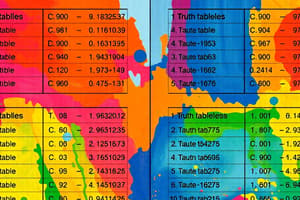Podcast
Questions and Answers
En lógica proposicional, las variables proposicionales también se conocen como proposiciones atómicas.
En lógica proposicional, las variables proposicionales también se conocen como proposiciones atómicas.
True (A)
El 'y' lógico en lógica proposicional se representa con el símbolo '∨'.
El 'y' lógico en lógica proposicional se representa con el símbolo '∨'.
False (B)
Una tabla de verdad es una forma de determinar el valor de verdad de una proposición para todas las combinaciones posibles de valores verdadero/falso asignados a las variables proposicionales involucradas en esa proposición.
Una tabla de verdad es una forma de determinar el valor de verdad de una proposición para todas las combinaciones posibles de valores verdadero/falso asignados a las variables proposicionales involucradas en esa proposición.
True (A)
En lógica proposicional, la negación se representa con el símbolo '¬'.
En lógica proposicional, la negación se representa con el símbolo '¬'.
En lógica proposicional, la sintaxis se refiere a la asignación de valores de verdad a cada variable proposicional.
En lógica proposicional, la sintaxis se refiere a la asignación de valores de verdad a cada variable proposicional.
Los conectivos lógicos principales en lógica proposicional son 'y' (∧), 'o' (|), y 'sí solo si' (⇔).
Los conectivos lógicos principales en lógica proposicional son 'y' (∧), 'o' (|), y 'sí solo si' (⇔).
Una variable proposicional en lógica puede tener más de dos valores posibles.
Una variable proposicional en lógica puede tener más de dos valores posibles.
Una fórmula bien formada en lógica proposicional se construye utilizando solo operadores lógicos.
Una fórmula bien formada en lógica proposicional se construye utilizando solo operadores lógicos.
El valor de verdad de la fórmula '(~p ∧ q) → p' es verdadero en todas las situaciones posibles.
El valor de verdad de la fórmula '(~p ∧ q) → p' es verdadero en todas las situaciones posibles.
En una tabla de verdad, la implicación (→) es verdadera solo cuando el antecedente es falso y el consecuente es verdadero.
En una tabla de verdad, la implicación (→) es verdadera solo cuando el antecedente es falso y el consecuente es verdadero.
Analizar tablas de verdad es una manera efectiva de evaluar la validez de argumentos proposicionales.
Analizar tablas de verdad es una manera efectiva de evaluar la validez de argumentos proposicionales.
Study Notes
Overview of Propositional Logic
Propositional logic is a branch of formal logic that focuses on the relationships between statements or propositions, which are statements describing certain states of affairs. It is concerned with determining the formal validity of arguments by employing logical operators such as 'and', 'or', and 'not'. Propositional logic is crucial in various fields, including mathematics, philosophy, computer science, and natural language processing.
Components of Propositional Logic
Propositional Variables
Propositional variables, also known as atomic propositions, are basic statements that must be true or false. For instance, "5 is a prime" or "program terminates" are examples of propositional variables.
Logical Connectives
Logical connectives are symbols used to combine one or more propositions into more complex statements. The main logical connectives in propositional logic include 'and' (∧), 'or' (∨), and 'not' (¬). For example, the statement "p and q" can be represented as p ∧ q, where p and q are propositional variables.
Truth Tables
A truth table is a way to determine the truth value of a proposition for all possible combinations of true/false values assigned to the propositional variables involved in that proposition. By creating a truth table, we can systematically analyze the consequences of an argument based on the given premises.
Syntax and Semantics
In propositional logic, the syntax and semantics of propositional formulas are crucial. A well-formed formula is constructed using atomic propositions and logical operators. The semantics of these formulas involve assigning truth values to each variable and then calculating the truth value of the entire formula based on those assignments.
For instance, if we have two propositional variables, p and q, with their respective truth values being True (T) and False (F), we can construct a truth table to represent various scenarios:
| p | q | ~p | p → q | (~p ∧ q) → p | |
|---|---|---|---|---|---|
| 1 | T | T | F | T | F |
| 2 | T | F | F | F | T |
| 3 | F | T | T | T | T |
| 4 | F | F | T | T | F |
The truth table shows us that the proposition "(~p ∧ q) → p" holds in scenario 4 but does not hold in any other scenario. Thus, by analyzing truth tables, we can effectively evaluate the validity of propositional arguments.
Studying That Suits You
Use AI to generate personalized quizzes and flashcards to suit your learning preferences.
Description
Descubre los fundamentos de la lógica proposicional, una rama de la lógica formal que analiza las relaciones entre proposiciones mediante operadores lógicos como 'y', 'o', y 'no'. Aprende sobre variables proposicionales, conectivos lógicos y tablas de verdad en este tutorial introductorio.




